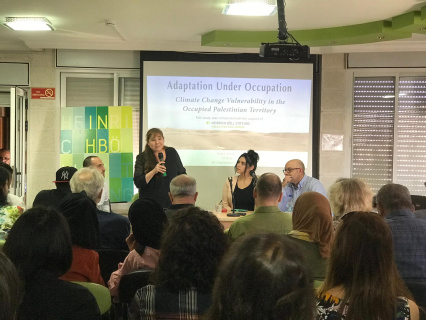
On Monday 30 September 2019, Al-Haq launched its latest report and documentary film on climate change adaptation in the south Hebron hills, located to the south of the occupied West Bank. The report and the film were produced with the support of the Heinrich Böll Stiftung. The event was hosted at the Heinrich Böll Stiftung’s office in Ramallah, and was attended by representatives from diplomatic missions, a range of local and international human rights, research and media organizations, as well as community members from the south Hebron hills.
In her opening remarks, Dr. Bettina Marx, director of the Heinrich Böll Stiftung’s office in Ramallah, stressed the significance of producing this report, particularly in light of the wave of climate strikes taking place around the world. Dr. Marx further stated that “we really are confronting a world-wide climate catastrophe… for Palestinians, climate change adaptability is hampered and made more difficult by the Israeli occupation”. Ms. Suha Jarrar, author of Al-Haq’s report, added that “climate change is a global catastrophe… yet it impact people differently and disproportionately… global climate action should place indigenous peoples, racialized populations and those who contribute the least to climate change, at the center of the global climate struggle”.
The event included a presentation of Al-Haq’s latest report Climate Change Adaptation under Occupation: Climate Change Vulnerability in the Occupied Palestinian Territory. The report examines the applicability of community-basedclimate change adaptation measures in the south Hebron hills, including in Masafer Yatta, one of the most climatically vulnerable areas of occupied Palestinian territory (OPT). The report assesses the ability of the occupied Palestinian population to adapt to climate change within the context of Israel’s prolonged occupation of the Palestinian territory since 1967. The report further highlights how Israel’s discriminatory policies and practices imposed on the occupied West Bank, particularly in Area C, impede the ability of Palestinians to effectively adapt to climate change. Examining the applicability of international law, including international environmental law to the context in the south Hebron hills and the Palestinian territory at large, the report concludes that Palestinians residing in climatically vulnerable areas, are precluded from applying basic community-based adaptation options, without the genuine realisation of the collective right of the Palestinian people to self-determination, including permanent sovereignty over their natural wealth and resources in the OPT.
The presentation was followed by the screening of The Struggle for Self-Determination in the Face of Climate Change, a film produced by Al-Haq, which captures the reality of climate change adaptation in the occupied Palestinian territory, within the context of Israel’s prolonged occupation. The film features examples from the south Hebron hills, and highlights the experiences of local farming and herding communities in facing the impacts of climate change, while simultaneously enduring Israel’s discriminatory policies and control over natural resources.

